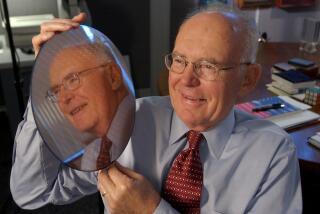U.S. Reverses Decision on Chip Patent : Technology: Federal agency to review its ruling crediting La Palma engineer Gilbert P. Hyatt with being the father of the microprocessor.
- Share via
LA PALMA — In a reversal of a decision last July, the U.S. Patent and Trademark Office has decided to review whether a controversial patent that credited a La Palma engineer with inventing the computer on a chip should instead be granted to a former Texas Instruments engineer.
The agency proceeding, officially known as an interference, will focus on who was the first to invent the computer on a chip, the brain of all electronic equipment from microwave ovens to pocket calculators.
After a 20-year legal ordeal, the patent office in July, 1990, granted Gilbert P. Hyatt of La Palma official recognition for his work in 1968 toward development of a family of chips now known as microprocessors.
The patent shook the roots of the multibillion-dollar semiconductor industry because it effectively gave Hyatt the right to seek millions of dollars in royalties from companies that make semiconductors based on technology covered by the patent.
The award also called into question the industry’s official history, which had credited researchers at industry giants Texas Instruments and Intel Corp. with the invention of the computer on a chip. Dallas-based Texas Instruments issued a statement Tuesday reiterating its previous contention that former TI engineer Gary W. Boone should be regarded as the pioneer of the computer on a chip based on his work in 1971. An amended patent application by TI and Boone prompted the decision to re-examine the patent.
In deciding to review the Hyatt patent, the patent office changed the effective date of Hyatt’s filing from December, 1970, to December, 1977. And patent examiners assigned a filing date in 1971. Patent attorneys said that the inventor with the earliest filing date ultimately prevails in patent disputes.
Stan Victor, a TI spokesman, said the burden of proof is now on Hyatt to show patent examiners that his invention came before Boone’s.
“We believe that the upcoming interference investigation by the U.S. Patent Office will determine that Boone of TI is the first and original inventor of the single-chip microcomputer,” said Melvin Sharp, TI’s general patent counsel.
Susan Nycum, a patent attorney in Palo Alto who has followed the case, agreed that TI now appears to have the upper hand in the proceeding.
“That doesn’t mean they will win,” she said. “There is a substantial burden on the junior party, which is now Mr. Hyatt. It’s an important step to resolving the question of who is the inventor.”
Hyatt, reached at his home on Tuesday, said he welcomed the patent office’s action because it will finally establish who invented the computer on a chip.
He said the later filing date assigned to his application is a technicality that he believes the patent office will overrule in the proceedings. He said the decision was not based on arguments from both sides in the case.
“My patent is still valid,” he said. “I invented the microcomputer before Boone did, I filed my patent application before he did, and I reduced it to practice in the form of a prototype before he did. So I’ve got all of the firsts. We were prepared for this, and we have our ducks lined up.”
TI said in its statement that it believes Boone’s patents cover an area of computing known as single-chip microcomputers. Unlike microprocessor chips, single-chip microcomputers contain internal computer programs that direct the chip to perform predetermined functions. Microprocessors rely on external program storage such as memory chips or disk drives.
Hyatt said the patent office review will require the presentation of evidence and testimony similar to a court trial. He said he planned to file a request to recover his original filing date of Dec. 30, 1970.
Boone, the engineer who was awarded several patents in the 1970s related to single-chip computer technology and is now a consultant in Colorado Springs, Colo., said he was confident that the review will resolve the issue of who invented the computer on a chip.
“My patent has been assigned a filing date of July 19, 1971,” Boone said. “Whoever has the earliest filing date wins.”
Boone’s patent was based on work he performed in bringing to market TI’s line of TMS1000 single-chip microcomputers. More than 250 million of the chips were sold and they found their way into calculators, home appliances, gasoline pumps, traffic lights and a host of other uses.
“I think it’s very clear that the (TI) project was the first time that anyone put the basic elements of the computer . . . on one chip,” he said.
The Hyatt patent is under the scrutiny of an army of attorneys who are trying to determine its scope and validity. Some say royalties could be as high as $200 million a year for Hyatt.
Besides Boone, those who begrudge Hyatt a place in history are former Intel Corp. researchers Marcian E. (Ted) Hoff and Federico Faggin, who, along with engineer Stan Mazor, have been credited with inventing the first commercially viable microprocessor, known as the Intel 4004.






